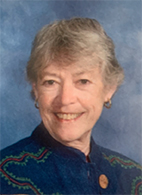
Elizabeth Hirtreiter
Jenny Snarski
Catholic Herald Staff
“No doubt there are countless Catholic chur
ches across America who have special members who put in many hours helping out in their churches. Our candidate for the Pax Christi Award is beyond comparison in this regard. It would take at least 10 people to fill her shoes.
“We are truly blessed to have her as a member of our little church here in northern Wisconsin.”
That is how Elizabeth (Betty) Hirtreiter of Butternut was introduced in the dossier nominating her for the Superior Diocesan Council of Catholic Women’s top annual honor, the Pax Christi Award.
Hirtreiter, a parishioner at Immaculate Conception parish in Butternut, was born and raised in Park Falls. She went to St. Anthony’s Catholic School and was sad to see it close in 2017.
Education – academic and religious – is not only important to Hirtreiter, it has been her lifelong career and mission.
As a young woman, after finishing two years of studies at the Ashland County Teacher’s College, her first teaching job was at a one-room schoolhouse with 25 students in grades one through eight.
“One of the best experiences of my life as I look back,” Hirtreiter said.
Although she taught another 40 years, the supportive community added to the impression those years made on the young teacher.
She also taught in Glidden with the remainder of her career in Butternut, teaching fourth grade and then leading the reading specialist program.
Hirtreiter’s nomination dossier stated, “Most of the students in our community were taught to read thanks to the dedication, patience and caring nature of this individual. Students from years back remember her with fondness and how she ignited their love of reading.”
“It was always such a good experience,” Hirtreiter said.
“I never said I went to work.
I always said I went to school.”
A pioneer working mother, Hirtreiter and her husband had four children in five years. She never quit teaching, with the help of her mother-in-law and sister-in-law who watched the children before they were school age.
When Hirtreiter’s oldest son was starting first grade, she began teaching religious education at Immaculate Conception. That was approximately 50 years ago, and for 40 of those she also offered herself as director of religious education.
For decades, Butternut schools have had a schedule that includes release time for religious education on Wednesday afternoons. Both the Catholic and Lutheran churches are within walking distance of the school, and students are walked to and from their respective churches by teachers. The bell rings at 1:50 p.m. for the release, and the children are back for dismissal with the rest of their classes.
Participation in the first- through sixth-grade program is 100 percent, but similar attendance is also seen for the evening middle and high school programs. However, Hirtreiter said the follow-through for going to Mass on Sundays is not there.
Of her own childhood, she said, “No matter what you did on the weekend, you always went to church on Sunday. And the family went together.
“I grew up in a family of six that we all went to Catholic school,” Hirtreiter added, “And when the nun said you come to something, it was just something you did.”
The trend she has seen take hold is that parents are letting children make their own choices. While she stated, “That’s why they call them children and us adults,” her tone was one of observation, not judgment.
Three generations have passed through Hirtreiter’s classrooms. When asked what changes she has seen over the decades, attendance at weekly Mass was her immediate answer.
She doesn’t have any clear answers on why that is or what to do about it, but noted that two common factors are that many children have weekend sports commitments or are coming from divorced families where time is split between two houses.
“COVID has not helped,” she mentioned, also acknowledging the external influences that have whittled away at Christian culture.
Hirtreiter and her fellow catechists – many of whom have also been teaching into their late 70s – know they have been planting seeds of faith.
“When these young people get a little older and see me, they tell me what they remember from confirmation,” Hirtreiter said, “even if they are not practicing at the moment. Who knows where and when the harvest will be.”
Hirtreiter complimented the dedication of the parish’s group of catechists and admitted that while it’s convenient for her to be involved, living just across the street from the church, she does feel it’s her calling.
“She is a faith-filled, lifelong learner,” the dossier affirmed, who “teaches our students and adults so much about the Catholic Church and its catechism.”
